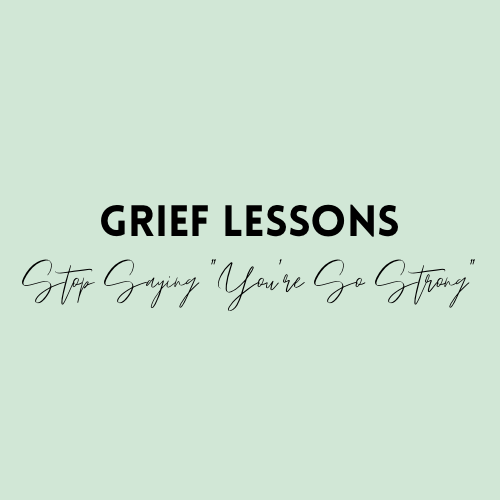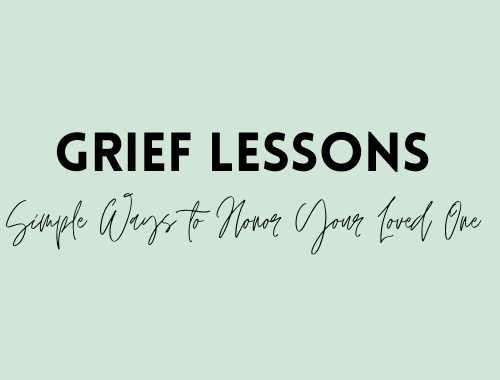
Stop Telling People Who Grieve That They Are “Strong”
“You’re so strong.”
“Your strength is inspiring.”
“I could never go through what you’ve gone through.”
These are just a few of the things I’ve heard people say to me, to other people who have faced loss, and about people who are grieving. I get it. The intentions behind saying it aren’t ever bad. But, it’s time to stop.
At first, I felt a twisted sort of pride whenever people would say these things to me. It was like, “Yes, I am strong. Yes, I faced something terrible. Yes, I’m better now because of this.” I soon realized that it actually made me place those expectations on myself.
Don’t get me wrong – you are strong. You are capable of facing grief. You are going to move forward with resilience. But, a person who’s grieving needs to get there on their own.
When people see someone make it out on the other side of grief seemingly fine, it’s easy to see their strength. It’s easy to see someone who grieves and see them come out from the depths of their grief. That is comfortable for people to see.
It’s easy to be inspired to face our struggles and challenges when we see someone else who has done it first. But, that’s not the full story.
Let’s take a deeper look into each of these phrases:
“You’re so strong.”
I’ll admit, I’ve said it to people. And sometimes, it’s honestly good to remind someone of their strength. What isn’t good is to put the expectation of strength onto another person.
When someone is grieving, the last thing they are feeling are strong. Don’t get me wrong, all people are different. But grief usually creeps in with loneliness, vulnerability, and sadness. While I don’t like that these are considered negative emotions or actions, I think it’s okay to associate them with hardship.
Grieving forces people to be weak. That’s just a fact. It will force you into a weakness that you haven’t known before. You can no longer avoid this weakness, because it’s everyday. But, the problem is that weakness has a negative connotation, while strength is considered positive.
Aren’t we all humans? Don’t we all have weaknesses? Yes. And if we keep trying to disguise that fact under the notion that strength is more important, it will ruin us.
If you or someone you know is grieving, let them be weak. Do not tell them “you’re so strong,” when all they feel is weak. It’s a nice sentiment, but you’re putting this idea in their head that they need to be strong.
You’re kind of telling them that when they are strong, people will be more “inspired.” If they are strong, people will be more comfortable with their grief. So, they hide their weakness, even when it hurts.
I didn’t realize this until so much later in my grief journey, if you want to call it that. I felt good that people were inspired by my story and how I kept myself going when I was grieving. It felt good that people were willing to hear my story about the lessons I learned and how I’ve grown since grieving.
What didn’t feel good? All the times I was ashamed to cry in front of another person when I was feeling weak. It didn’t feel good to share my grief when I didn’t have something positive to say about it. I conditioned myself to be able to share the “strength” side of my grief rather than be okay with sharing my weakness.
This just added to my grief. I didn’t allow myself to be weak, because everyone was telling me I was strong. So, please, stop telling people “you’re so strong.” Let them be weak. Let them not be okay. Let them grieve without putting expectations on when or how they do it.
“Your strength is inspiring.”
I mentioned this in the last section, but it’s important to dive deeper into this. I’m glad you are inspired, yes. I’m glad what I’m going through might help you in some way. I think it’s great to learn things from other people. But don’t put me on a weird sort of pedestal because of it. It was never about me.
Grief usually isn’t about yourself – it’s about the person you lost. How did they inspire you? I want to hear about that.
Also, if you are really inspired by my “strength,” are you willing to be inspired by my weakness? If you are really inspired by my “strength,” are you actually going to change anything?
Too often, people just say this because it’s common to say. But, I challenge you to be more specific if you’re going to say this. If a person loses someone to grief, in what ways did me going through this inspire you? Don’t just say that just to say it. Don’t put this expectation of “strength” onto me if it’s not real.
Again, it comes from a good place with good intentions. But, it still places that expectation of strength onto the person that is grieving. Will you still be inspired if I showed you my weakness through it all? Would you still be inspired if I wasn’t strong?
Now, the pressure is back on me to be strong so that you stay inspired. It’s now up to me to play the good character that can be strong for everyone else. It still means that I am not allowed to grieve how I need to, because it’s now about inspiring the people around me.
So, I challenge you. If you’re going to tell someone how they’ve inspired you, be specific about it what you’ve done to change because of them. I just want you to remember to let the person grieve how they need to grieve.
“I Could Never Go Through What You’ve Gone Through.”
While this isn’t technically using the word strong, it’s insinuating it. It’s insinuating that you are somehow stronger than they are because you are grieving. Again, stop saying stuff like this.
First of all, are you saying that you could never be a human? Everyone grieves. Everyone has grieved, and everyone will grieve. Simply because they are doing it before you or in a different way than you doesn’t mean that you could never do it.
I want everyone to remember that life is short. I didn’t ever picture that I would lose my dad when I did. It wasn’t in the plan I had set out for myself. I, too, never thought that I could or would have to go through that. But, life happens. I wish it didn’t, but I can’t control life.
While this phrase at least acknowledges the difficulty of grief, it doesn’t leave room for weakness. I can say it a million times. Please, just leave room for the weakness.
You are now essentially telling that person that you can’t handle their grief. You are telling them you could never face that. So, are you saying I shouldn’t burden you with my grief because you can’t handle it?
I know that’s not what you’re trying to say. But, to someone who is grieving, it is isolating. It is as if this was my battle alone, and other people couldn’t understand or honestly, don’t want to understand.
If someone says this to me, I feel like I have to give them words of encouragement or inspiration. It makes me feel like I have to offer something to the table. It makes me feel like I now have to react in a way that makes you feel good. But, when grieving, I already feel like I have nothing left to give.
So, please don’t say you couldn’t do it. Everyone will have their own unique challenges in their life. You never know what yours could be. First of all, don’t put yourself down like that because your own challenges are different than mine. We don’t need to be able to face someone else’s struggles. You have your own things, and I have mine. And that’s okay.
In the end, it’s a good thing to be talking to someone about grief. Grief is unique, and grief is ugly, and grief is lonely. Thank you for actually talking to someone about it. But, make sure you let them take their own path.
If they are having a good day, and you think to yourself that they are strong – that’s okay. You just never know if maybe this specific day is the one good day they’ve had in a long time. Maybe that’s the day they chose to get outside and enjoy the world. Maybe the day before that they were crying, unable to get out of bed.
Even the person who grieves doesn’t know what each day will bring. One day they may seem strong when really they are feeling anything but. A smile can hide a lot.
All I ask is that you make sure you aren’t putting your expectation of strength onto that person. Don’t put grief into a box where if it doesn’t make the person “strong” or make you feel “inspired,” then you can’t look. It’s isolating, and it’s lonely, and it completely underestimates the power of human weakness.
Tell people how you feel, but allow room for movement. Strength may not happen every day. Weakness may not be needed every day. Just give people who grieve the wiggle room they need to be whatever they need to be.
For more on ways to help a friend or loved one experiencing grief:
You May Also Like

10 Incredible Stops on Going-to-the-Sun Road in 1 Day
December 30, 2020
10 Simple Ways to Honor Your Loved One (and Yourself!) on Anniversary Days
December 14, 2020



2 Comments
Pingback:
Pingback: